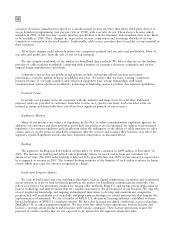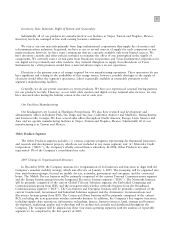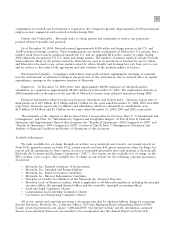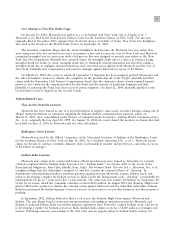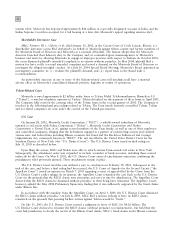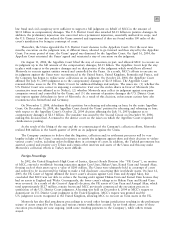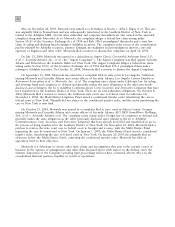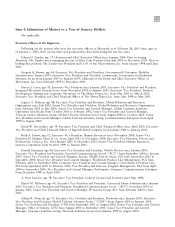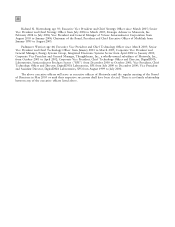Motorola 2004 Annual Report Download - page 29
Download and view the complete annual report
Please find page 29 of the 2004 Motorola annual report below. You can navigate through the pages in the report by either clicking on the pages listed below, or by using the keyword search tool below to find specific information within the annual report.
21
Case relating to Two-Way Radio Usage
On January 23, 2004, Motorola was added as a co-defendant with New York City in Virgilio et al. v.
Motorola et al., Ñled in the United States District Court for the Southern District of New York. The suit was
originally Ñled in December 2003 (against New York City alone) on behalf of twelve New York City ÑreÑghters
who died in the attack on the World Trade Center on September 11, 2001.
The amended complaint alleges that the twelve ÑreÑghters died because the Motorola two-way radios they
were using were defective and did not receive evacuation orders and because the City of New York and Motorola
committed wrongful acts in connection with a bid process that was designed to provide new radios to the New
York City Fire Department. PlaintiÅs have asserted claims for wrongful death due to a defect in product design,
wrongful death for failure to warn, wrongful death due to fraudulent misrepresentations and deceitful conduct,
wrongful death due to negligent misrepresentations, and concerted action against both Motorola and the City of
New York. PlaintiÅs seek compensatory and punitive damages against Motorola in excess of $5 billion.
On March 10, 2004, the court, to which all September 11 litigation has been assigned, granted Motorola's and
the other defendant's motion to dismiss the complaint on the grounds that all of the Virgilio plaintiÅs had Ñled
claims with the September 11th Victims' Compensation Fund, that the statutory scheme clearly required injured
parties to elect between the remedy provided by this Fund and the remedy of traditional litigation and that
plaintiÅs, by pursuing the Fund, had chosen not to pursue litigation. On April 12, 2004, plaintiÅs appealed to the
United States Court of Appeal for the Second Circuit.
Iridium-Related Cases
Class Action Securities Lawsuits
Motorola has been named as one of several defendants in putative class action securities lawsuits arising out of
alleged misrepresentations or omissions regarding the Iridium satellite communications business, which on
March 15, 2001, were consolidated in the District of Columbia under Freeland v. Iridium World Communications,
Inc., et al., originally Ñled on April 22, 1999. On August 31, 2004, the court denied the motions to dismiss that had
been Ñled on July 15, 2002 by Motorola and the other defendants.
Bankruptcy Court Lawsuit
Motorola was sued by the OÇcial Committee of the Unsecured Creditors of Iridium in the Bankruptcy Court
for the Southern District of New York on July 19, 2001. In re Iridium Operating LLC, et al. v. Motorola asserts
claims for breach of contract, warranty, Ñduciary duty, and fraudulent transfer and preferences, and seeks in excess
of $4 billion in damages.
Iridium India Lawsuits
Motorola and certain of its current and former oÇcers and directors were named as defendants in a private
criminal complaint Ñled by Iridium India Telecom Ltd. (""Iridium India'') in October 2001 in the Court of the
Extra Judicial Magistrate, First Class, Khadki, Pune, India. The Iridium India Telecom Ltd. v. Motorola, Inc. et al.
complaint alleges that the defendants conspired to, and did, commit the criminal oÅense of ""cheating'' by
fraudulently inducing Iridium India to purchase gateway equipment from Motorola, acquire Iridium stock, and
invest in developing a market for Iridium services in India. Under the Indian penal code, ""cheating'' is punishable by
imprisonment for up to 7 years and a Ñne of any amount. The court may also require defendants to compensate the
victim for its losses, which the complaint estimates at about $100 million. In August 2003, the Bombay High Court
granted Motorola's petition to dismiss the criminal action against Motorola and the individual defendants. Iridium
India has petitioned the Indian Supreme Court to exercise its discretion to review that dismissal, and that petition is
pending.
In September 2002, Iridium India also Ñled a civil suit in the Bombay High Court against Motorola and
Iridium. The suit alleges fraud, intentional misrepresentation and negligent misrepresentation by Motorola and
Iridium in inducing Iridium India to purchase gateway equipment from Motorola, acquire Iridium stock, and invest
in developing a market for Iridium services in India. Iridium India claims in excess of $200 million in damages and
interest. Following extensive proceedings in the trial court and on appeal related to Iridium India's motion for







